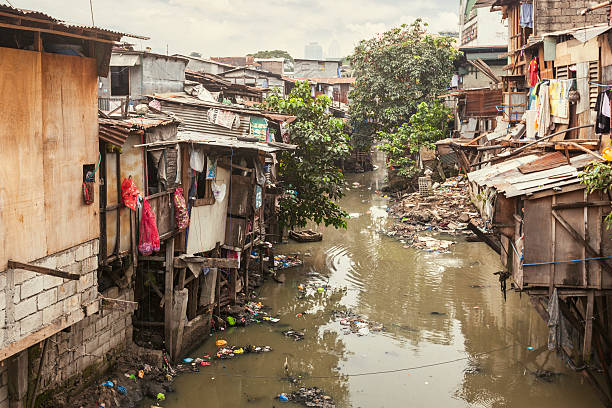/ News
Views: 535
Trapped in Decay: The Unbearable Living Conditions in Ikpara Slum, Warri

Warri, Delta State — Beneath the towering ambitions of modern development lies a forgotten quarter — Ikpara, a neglected slum in the heart of Warri, where thousands of residents are trapped in squalor, poverty, and desperation. For the people who call this place home, every day is a battle for dignity amid filth, insecurity, and infrastructural decay.
Ikpara located off the busy Iyara Road, is hidden in plain sight. It is a chaotic enclave of collapsing zinc-roofed shanties, murky waters, and choking refuse piles. The air is heavy with the stench of human waste flowing freely from broken latrines and overflowing septic tanks, while the eyes are greeted by makeshift houses barely standing on rotting wooden stilts.
A Community Abandoned
“We are living like animals,” says Mama Ejiro, a petty trader and mother of five, her face lined with frustration. “No water, no light, and when rain falls, everything inside my house gets wet. We are tired of calling on the government.”
Access to clean water is a luxury in Ikpara. Residents depend on contaminated shallow wells or pay exorbitant fees to water vendors. Electricity is epileptic, when not completely unavailable. The drainage systems are either clogged or nonexistent, and every rainy season turns the area into a disease-prone swamp.
Health conditions are dire. With no functional health centre nearby, residents travel far to the Warri Central Hospital or rely on unlicensed chemists for medical care. Cases of malaria, typhoid, and cholera are rampant, especially among children. The community’s only primary school is dilapidated, with broken furniture and unmotivated teachers.
Breeding Ground for Crime
In the absence of functional governance and social services, crime festers. Cult activities, drug peddling, and petty theft are common. At night, many residents lock themselves in early to avoid being victims of robbery or harassment by armed youths.
“Young boys here are jobless, and many take to smoking weed and joining gangs,” laments Mr. Odafe, a local carpenter. “If nothing is done, these children will grow up with no future. Government should come now, not when it is too late.”
Flooding and Environmental Hazards
Beyond poverty and insecurity, flooding has become an annual nightmare. During heavy downpours, entire streets are submerged, forcing families to sleep on tables or relocate temporarily. The lack of a drainage master plan means water has nowhere to go but into people’s homes.
“This is not just an environmental problem,” says a local, Faith Oghenekevwe. “It is a public health disaster. This slum is sitting on a ticking time bomb.”
A Cry for Intervention
While politicians visit Ikpara during campaigns, promising heaven and earth, nothing changes after elections. The slum remains off the radar of infrastructural development plans by both the Delta State government and the Warri South Local Government Council.
NGOs and religious bodies have made occasional interventions — distributing mosquito nets, holding free medical outreaches, or sinking boreholes — but these efforts are few and far between.
The Human Spirit Amid Hardship
Yet, in the midst of this hardship, the human spirit thrives. Children laugh as they play with discarded tires, and women find ways to support each other through cooperative savings schemes. Residents gather in occasional meetings, planning clean-ups and dreaming of a better future.
“We are poor, yes, but we have not lost hope,” says Mama Ufuoma, a food vendor. “All we ask is for the government to remember we exist and help us live like human beings.”
Ikpara is a stark reminder of the other side of urban life — the side where development has not touched. The people here are not lazy or helpless; they are simply victims of sustained neglect. If Warri is ever to truly develop, it must begin by lifting its forgotten slums, starting with Ikpara.